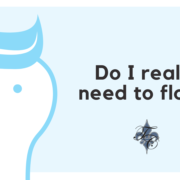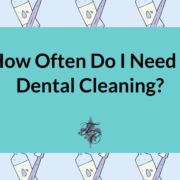Do I really need to floss?
We’ve all been told to floss. From television ads advertising oral hygiene products to visits to the dentist, we have been exposed to the concept of flossing.
The problem is, however, that many people don’t actually floss on a regular basis. Perhaps they believe that brushing their teeth is enough. Or, maybe flossing seems very mundane and cumbersome. Whatever your reason for not flossing is, it’s important to know that this act of self-care is very important to safeguarding your oral health.
Brushing alone is not enough to protect our teeth and gums. This is because a toothbrush and toothpaste can’t reach all the surfaces in our mouth. In fact, thorough and proper brushing can only clean about 70% of the surfaces of teeth. Having 30% of our mouths uncleaned on a regular basis can lead to the development of serious and destructive oral health concerns.
What does flossing do?
Flossing helps remove debris between teeth and removes the film of bacteria known as “plaque.” Plaque that is not removed can harden into tartar once it is exposed to calculus. Once tartar forms, it can only be removed through a professional cleaning from a dentist or dental hygienist.
When we forego flossing, tartar will begin to accumulate at the gum line. As tartar builds up, the gums will recede from teeth and become inflamed. Without improved oral hygiene and professional cleanings, tartar buildup will lead to the development of a common condition called “gingivitis.”
When oral hygiene is inadequate, this bacteria-laden tartar and plaque can spread even deeper below the gum line, causing periodontitis—a more progressive form of gingivitis. Periodontitis is the leading cause of tooth loss and can also destroy bone in the jaws.
Flossing can prevent the accumulation of tartar that leads to gum disease. It also helps control oral bacteria by disrupting its colonization at the gum line. An additional benefit to regular flossing is that it stimulates the gingiva, which has additional protective benefits when it comes to maintaining good oral health.
When is the best time to floss?
According to the American Dental Association, you can floss either before or after brushing.
However, if you use dental floss before you brush, the fluoride from the toothpaste has a better chance of reaching between teeth. Unlike brushing, you only need to floss once a day. Although you may choose to do it in the morning or afternoon, many prefer to floss at night to prevent food and debris from remaining in the crevices of the teeth overnight. This could prevent the build-up of plaque too.
What type of floss should I use?
When picking a floss, it’s easy to get overwhelmed with how many brands and varieties there are. There are other types of interdental cleaners such as handheld flossers, picks, and water irrigators, too.
When selecting oral hygiene tools and products, we encourage you to buy items with the ADA seal of acceptance. You may want to try a few different types of floss and products to determine what works best for your needs. Some folks find that a combination of products—such as waxed dental floss and a water irrigator—provide the best results.
The main objective is to find products that you will use on a daily basis. Our knowledgeable staff is happy to help you make product selections. Feel free to call with questions or ask for our recommendations at your next appointment.
A few helpful tips when choosing:
- Large gaps between teeth? Try dental tape
- Not much space between your teeth? Try waxed floss, which glides more easily between crowded surfaces.
- Want less mess? Look for disposable flossers
- Braces or bridges? A spongy floss is a great option.
- Wear prosthetics like bridges and fixed dentures? Consider investing in a water irrigator.
Schedule a dental cleaning today
Even if you commit to flossing daily, you will still need routine dental cleanings at our practice. Dental cleanings remove surface debris and tartar with specialized instruments. The ADA recommends that patients with good oral health receive two cleanings a year spaced six months apart. Those who have developed gum disease may require more frequent prophylaxis.
Give our Lafayette dental practice a call at (337) 234-2186 to schedule your next cleaning and checkup with our gentle dentist, Dr. Chavin.





